In The Politics of Prudence, Russell Kirk dismissed the notion of conservatism grounding itself in a single foundational text. Since conservatism is “neither a religion nor an ideology,” Kirk concluded it “possesses no Holy Writ and no Das Kapital to provide dogmata.” Sure, Chronicles readers can recite the political dicta of Edmund Burke, Joseph de Maistre, and John Adams. We confront life’s complexity through the tales of Graham Greene, Giuseppe di Lampedusa, and Fyodor Dostoevsky. Plato, Virgil, and Aquinas help us understand reality. But it seems the more we read, the more we realize we don’t know, and the more we keep reading, ad infinitum. Sometimes our pursuit of the truth forces us off the conservative bookshelf. And sometimes we discover nuggets of wisdom in unlikely sources, written by authors an ideologue would ignore. Here we honor Kirk’s aversion to ideology as we present conservative truths from unlikely sources.
—John Greenville
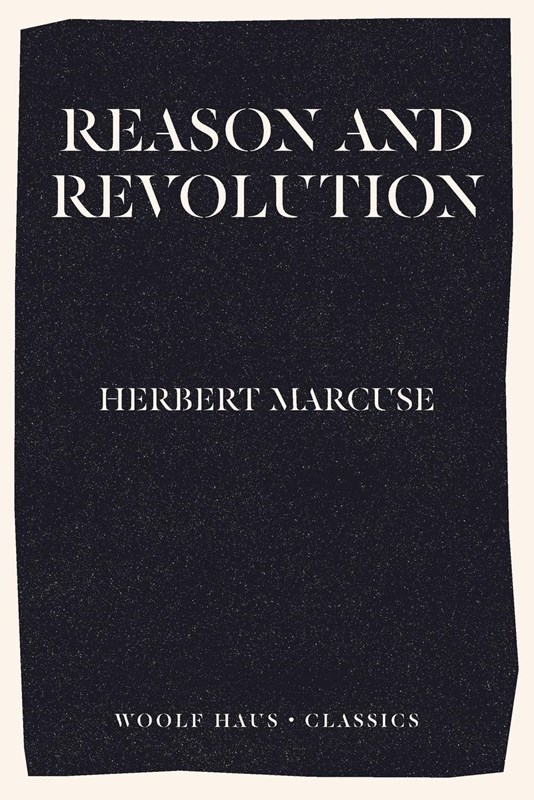 Reason and Revolution by Herbert Marcuse (1941). Of all the works written by my onetime professor, this stands out as his best. It was Marcuse’s first book-length study and it was written in English rather than German. German was the language in which Marcuse produced his earlier writings, mostly in defense of Marx’s dialectic and the derivation of that concept from Hegel’s speculative philosophy.
Reason and Revolution by Herbert Marcuse (1941). Of all the works written by my onetime professor, this stands out as his best. It was Marcuse’s first book-length study and it was written in English rather than German. German was the language in which Marcuse produced his earlier writings, mostly in defense of Marx’s dialectic and the derivation of that concept from Hegel’s speculative philosophy.
Unlike his later works, like Eros and Civilization (1955), which combines neo-Freudian and socialist critiques, or Marcuse’s now unfortunately superfluous warnings in our current cancel-culture about “repressive tolerance,” Reason and Revolution shows his extraordinary knowledge as a scholar of German philosophy. It matters little if this book argues tendentiously that post-Hegelian philosophy that did not turn into Marxism instead led to fascism. Marcuse’s discussion of Hegel’s dialectic and Hegel’s rejection of Kant’s abstract rationalist morality is easily worth the price of this book, which can still be bought second-hand.
Reason and Revolution is one of the clearest expositions of Hegel’s dialectical reasoning known to me, which is remarkable, given that its author was then still dis-
accustoming himself from his German prose-style.
—Paul Gottfried
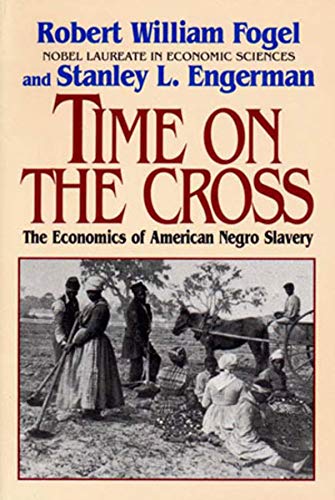 Time on the Cross: The Economics of American Negro Slavery, by Robert W. Fogel and Stanley L. Engerman (1974). The end of slavery in the Western hemisphere registered a seismic shift in moral sensibility. An institution ubiquitous in history, validated by all the world’s great religions, and remarkably profitable on plantations throughout the Americas, came to a legal end in about a century.
Time on the Cross: The Economics of American Negro Slavery, by Robert W. Fogel and Stanley L. Engerman (1974). The end of slavery in the Western hemisphere registered a seismic shift in moral sensibility. An institution ubiquitous in history, validated by all the world’s great religions, and remarkably profitable on plantations throughout the Americas, came to a legal end in about a century.
No scholars have contributed more to unraveling the economic riddles of slavery than Robert W. Fogel, a former Communist, and his liberal partner Stanley L. Engerman. Abolitionist crusaders at first tried to rely on economic theory to underscore the institution’s regressiveness, and to bolster their case they turned initially to Adam Smith, who wrote, “The experience of all ages and nations… demonstrates that the work done by slaves, though it appears to cost only their maintenance, is in the end the dearest of any.”
A nearby passage in Smith, however, conveniently neglected by slavery’s critics, posed a paradox that Smith himself never explained: “The profits of a sugar-plantation in any of our West Indian colonies are generally much greater than those of any other cultivation that is known either in Europe or America.”
As Fogel and Engerman demonstrate, market forces cannot explain slavery’s end, as slaveholders proved remarkably entrepreneurial. They preferred to rely on rewards and incentives rather than the lash to improve output. The material well-being of slaves in the antebellum United States on average surpassed that of free laborers in Europe at the same time.
Thus, despite the importance of Fogel and Engerman’s work to the scholarship on American slavery, don’t look for Time on the Cross to be cited by the “1619 Project.”
—Robert Paquette
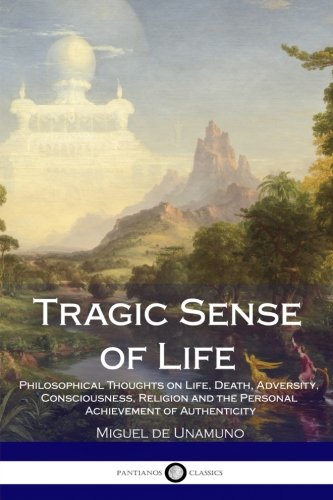 The Tragic Sense of Life, by Miguel de Unamuno (1912). Spanish writer Miguel de Unamuno produced in his masterpiece, The Tragic Sense of Life, one of the most profound investigations of human anxiety in the face of death I have read. Philosophy and religion are enemies who nonetheless need one another, he tells us, and their struggle against one another is productive for man, the being who invented and practices them both. Unamuno was politically a classical liberal antipathetic to the conservative nationalism ascendant in Spain in the 1930s.
The Tragic Sense of Life, by Miguel de Unamuno (1912). Spanish writer Miguel de Unamuno produced in his masterpiece, The Tragic Sense of Life, one of the most profound investigations of human anxiety in the face of death I have read. Philosophy and religion are enemies who nonetheless need one another, he tells us, and their struggle against one another is productive for man, the being who invented and practices them both. Unamuno was politically a classical liberal antipathetic to the conservative nationalism ascendant in Spain in the 1930s.
“There is,” Unamuno writes, “no religion without some philosophic basis, no philosophy without roots in religion.” He was torn between the two throughout his life, endeavoring, in his tortured, agonized way, never to fully abandon or embrace either.
Yet the question of the outcome of their fierce if familial struggle is not left unresolved. Philosophy alone, in his account, inevitably leaves the indomitable human will to surrender to death, bleakly staring without hope into the final horizon that steadily approaches. The desire to leap over the chasm can only be rescued by a desperate, daring, passionate act of faith.
—Alexander Riley
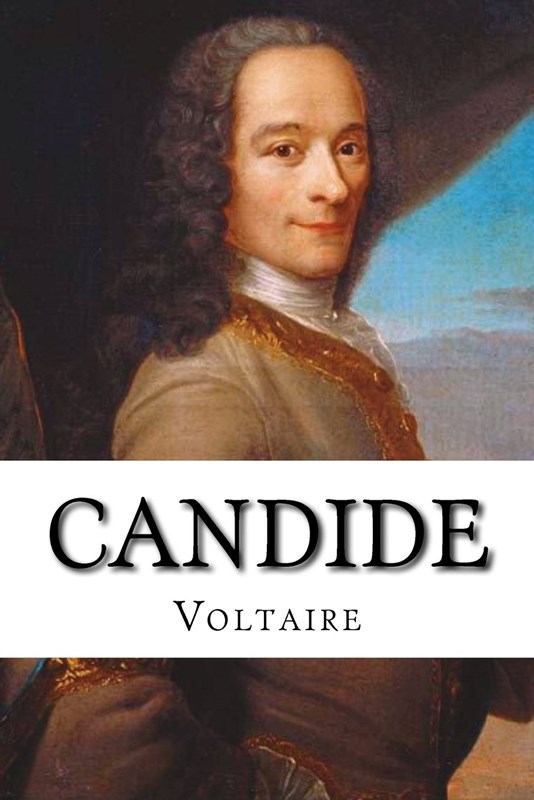 Candide, by Voltaire (1759). Voltaire’s Candide is the best-known work of probably the best-known French writer of the 18th century. Voltaire is often credited with contributing more than his share to what is generally called the Enlightenment, and Candide is a rollicking, brilliant, and occasionally bawdy satire on the establishment classes of his age, particularly those found in the Catholic Church, the aristocracy, government, and the military. The book doesn’t make its points through lengthy philosophical discourses, but rather through pithy comic scenarios and catastrophic events which befall his characters, out of which they eventually emerge through sheer pluck.
Candide, by Voltaire (1759). Voltaire’s Candide is the best-known work of probably the best-known French writer of the 18th century. Voltaire is often credited with contributing more than his share to what is generally called the Enlightenment, and Candide is a rollicking, brilliant, and occasionally bawdy satire on the establishment classes of his age, particularly those found in the Catholic Church, the aristocracy, government, and the military. The book doesn’t make its points through lengthy philosophical discourses, but rather through pithy comic scenarios and catastrophic events which befall his characters, out of which they eventually emerge through sheer pluck.
I’ve read Candide several times, and as a conservative who values traditions and traditional institutions, Voltaire’s viewpoint is appalling. But hidden in its iconoclasm is also a subtle lesson about the limits of the human character, and the difficulty of carrying out one’s responsibilities.
Voltaire’s humor and subtlety lose something in translation, but one brief episode will give a sense of the flavor. He recounts, based on a true event, the execution by the English of one of their highest ranking naval officers for a military mistake. The English find it necessary, he explains, from time to time, to kill an admiral “pour l’encouragement des autres.” Literally, “to encourage the others.”
—Stephen B. Presser
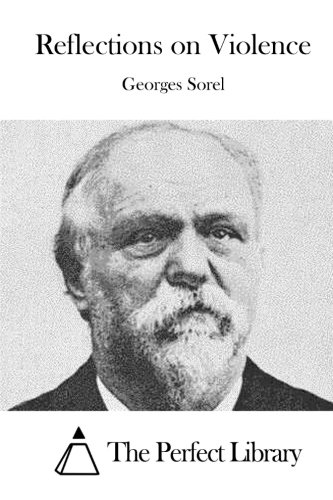 Reflections on Violence, by Georges Sorel (1908). One of the most salient characteristics of the right at this moment is the catastrophic failure of conservative arguments to stand athwart history and stop much of anything, to borrow Buckley’s phrase. The genteel conservative hopes to convert the masses by generating more books, articles, and informational videos, while scoffing at violent agitators on the left. But leftist agitation has resulted in legislative victories, each of which has chipped away at what little remains of what we call “our way of life.”
Reflections on Violence, by Georges Sorel (1908). One of the most salient characteristics of the right at this moment is the catastrophic failure of conservative arguments to stand athwart history and stop much of anything, to borrow Buckley’s phrase. The genteel conservative hopes to convert the masses by generating more books, articles, and informational videos, while scoffing at violent agitators on the left. But leftist agitation has resulted in legislative victories, each of which has chipped away at what little remains of what we call “our way of life.”
In Reflections on Violence, French Anarchist philosopher Georges Sorel outlines his belief in the power of direct action, motivated by irrational myths, to bring about political change. Sorel was an unorthodox figure among French philosophers and theorists, whose variety of Marxism rejected belief in inevitable and evolutionary change, emphasizing instead the importance of will and direct action. Belief, not data, motivates action, Sorel believed.
When reason comes to blows with rage, and disembodied logos meets the burning breast of thumos, merely yelling “stop” is a feeble solution.
—Pedro Gonzalez
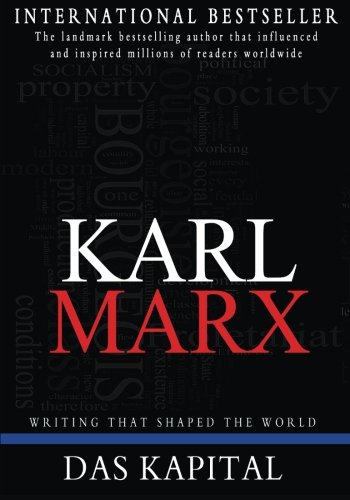 Das Kapital, by Karl Marx (1867). Adam Smith attributed capitalism’s abundance to the division of labor, his phrase for the decomposition of the manufacturing process into ever simpler, production-boosting tasks. Smith lamented how one worker alone “could scarce, perhaps with his utmost industry, make one pin in a day.” But after splitting the work among laborers, he surmised a factory could turn out 48,000 pins daily.
Das Kapital, by Karl Marx (1867). Adam Smith attributed capitalism’s abundance to the division of labor, his phrase for the decomposition of the manufacturing process into ever simpler, production-boosting tasks. Smith lamented how one worker alone “could scarce, perhaps with his utmost industry, make one pin in a day.” But after splitting the work among laborers, he surmised a factory could turn out 48,000 pins daily.
Making a pin from scratch—smelting the metal, molding the shape, and sharpening the tip—fosters a sense of accomplishment. Conversely, the mind-numbing repetition in the division of labor quickly turns workers into soulless automata. Think of Charlie Chaplin as the harried grunt in Modern Times, racing to keep pace on the frenzied assembly line. He eventually got swallowed by the machine.
In Das Kapital, Karl Marx observed how an artisan makes use of a tool, whereas a factory makes use of a worker as a tool, much like the demoralized Chaplin. Conservatives like to talk about human dignity when it comes to unjust war or abortion, but are less inclined to mention it when it comes to the dark side of industrial capitalism. Imagine your delight as you exit the Apple store with the latest iPhone. You bump into Adam Smith’s ghost in the parking lot. He high fives you and says, “Great buy!” as you watch a video together of fainting goats. Then, right before you hop in your car, Karl Marx’s beastly phantasm grabs you by the lapels and snarls, “Was your purchase worth the life of the FoxConn worker in China, who jumped out the factory window in despair?”
—John Greenville
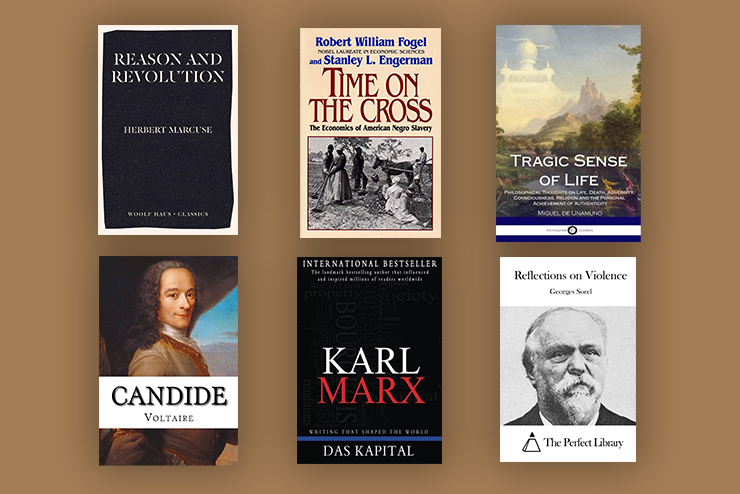
Leave a Reply